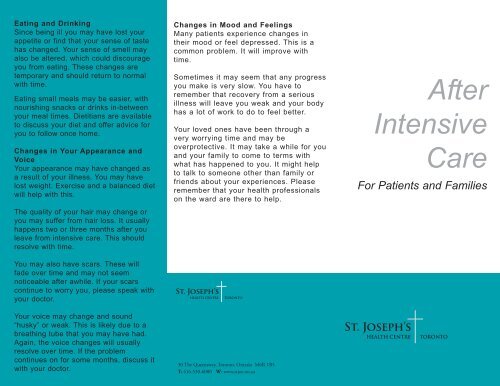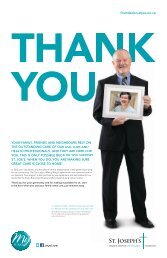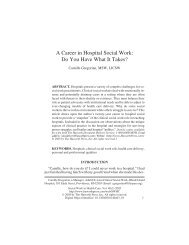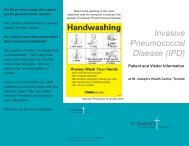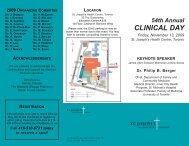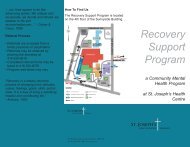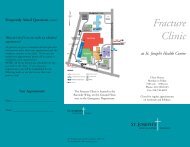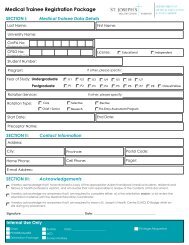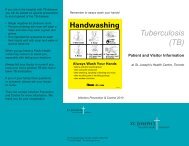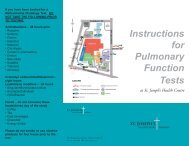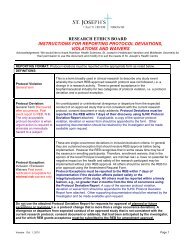After Intensive Care - St. Joseph's Health Centre Toronto
After Intensive Care - St. Joseph's Health Centre Toronto
After Intensive Care - St. Joseph's Health Centre Toronto
- No tags were found...
Create successful ePaper yourself
Turn your PDF publications into a flip-book with our unique Google optimized e-Paper software.
Eating and DrinkingSince being ill you may have lost yourappetite or find that your sense of tastehas changed. Your sense of smell mayalso be altered, which could discourageyou from eating. These changes aretemporary and should return to normalwith time.Eating small meals may be easier, withnourishing snacks or drinks in-betweenyour meal times. Dietitians are availableto discuss your diet and offer advice foryou to follow once home.Changes in Your Appearance andVoiceYour appearance may have changed asa result of your illness. You may havelost weight. Exercise and a balanced dietwill help with this.The quality of your hair may change oryou may suffer from hair loss. It usuallyhappens two or three months after youleave from intensive care. This shouldresolve with time.You may also have scars. These willfade over time and may not seemnoticeable after awhile. If your scarscontinue to worry you, please speak withyour doctor.Your voice may change and sound“husky” or weak. This is likely due to abreathing tube that you may have had.Again, the voice changes will usuallyresolve over time. If the problemcontinues on for some months, discuss itwith your doctor.Changes in Mood and FeelingsMany patients experience changes intheir mood or feel depressed. This is acommon problem. It will improve withtime.Sometimes it may seem that any progressyou make is very slow. You have toremember that recovery from a seriousillness will leave you weak and your bodyhas a lot of work to do to feel better.Your loved ones have been through avery worrying time and may beoverprotective. It may take a while for youand your family to come to terms withwhat has happened to you. It might helpto talk to someone other than family orfriends about your experiences. Pleaseremember that your health professionalson the ward are there to help.30 The Queensway, <strong>Toronto</strong>, Ontario M6R 1B5T: 416-530-6000 W: www.stjoe.on.ca<strong>After</strong><strong>Intensive</strong><strong>Care</strong>For Patients and Families
<strong>After</strong> <strong>Intensive</strong> <strong>Care</strong>When you have been ill and inintensive care, it may take time for youto return to your normal self. Exactlyhow long it will take will depend on thelength of time you have been ill, yourstate of health before your illness, yourweight loss since coming to hospital,and whether or not your illness meansthat you will have to change someparts of your lifestyle.Going to the WardThe thought of going to a newenvironment can be worrying. Restassured, the staff on the ward are veryexperienced in caring for people whohave been seriously ill. Once you aretransferred to the ward, a newphysician and health care team will beresponsible for your care. They arebest suited to meet your current needsin this phase of your illness.On the ward, each nurse isresponsible for several patients andwill not be at your bedside all the time.This can be frightening at first, but anurse will be nearby. If you need anyhelp, there is a call bell for you to useand someone will be with you asquickly as possible.If you have concerns, discuss themwith your doctor and nurses. To helpthe transition, the REACT team, whichis a team of ICU nurses, physiciansand respiratory therapists, will followyour progress for the first few daysafter you leave the <strong>Intensive</strong> <strong>Care</strong>Unit.Most of the rooms in the hospital aresemi-private, which means you mayshare your room with another person.A television is available to rent, as wellas a telephone, for a daily fee. Pleasetalk to your nurse. If you need to makelong distance calls, more charges willapply. Visiting hours are from 11:00a.m. to 9:00 p.m., with two visitors inyour room at a time.ExerciseYour ability to do small activities maybe difficult and very tiring. During yourintensive care stay you may have lostweight and muscle strength. Yourjoints may also be stiff since you havenot been active for some time.Take it slowly at first and graduallyincrease your activity. It may takemonths before you feel you are backto normal. You will most likely needfrequent rests in the day, especially atthe beginning. Physiotherapists andoccupational therapists are available tohelp with exercises to aid in yourrecovery. For encouragement, keep adiary. This will help you reflect on yourprogress and it will help motivate youon those days when you feel you arenot improving.SleepWhen you were very ill, your sleeppattern was disrupted. There was littledifference between night and day.Returning to a normal sleep patternmay take a while. Being awake at nightcan be worrying. It is common for asmall problem to seem overwhelmingin the middle of the night, when youare the only person awake. If thishappens, it may be helpful to read orlisten to the radio, tape or CD.Relaxation tapes can be helpful forsome people.Some of our patients experiencenightmares. They can be frightening,vivid and appear real, but they dosubside over a few days or weeks.This is quite normal. They are mostlikely caused by a combination of themedications you received, alteredhormone levels and your disruptedsleep pattern.


